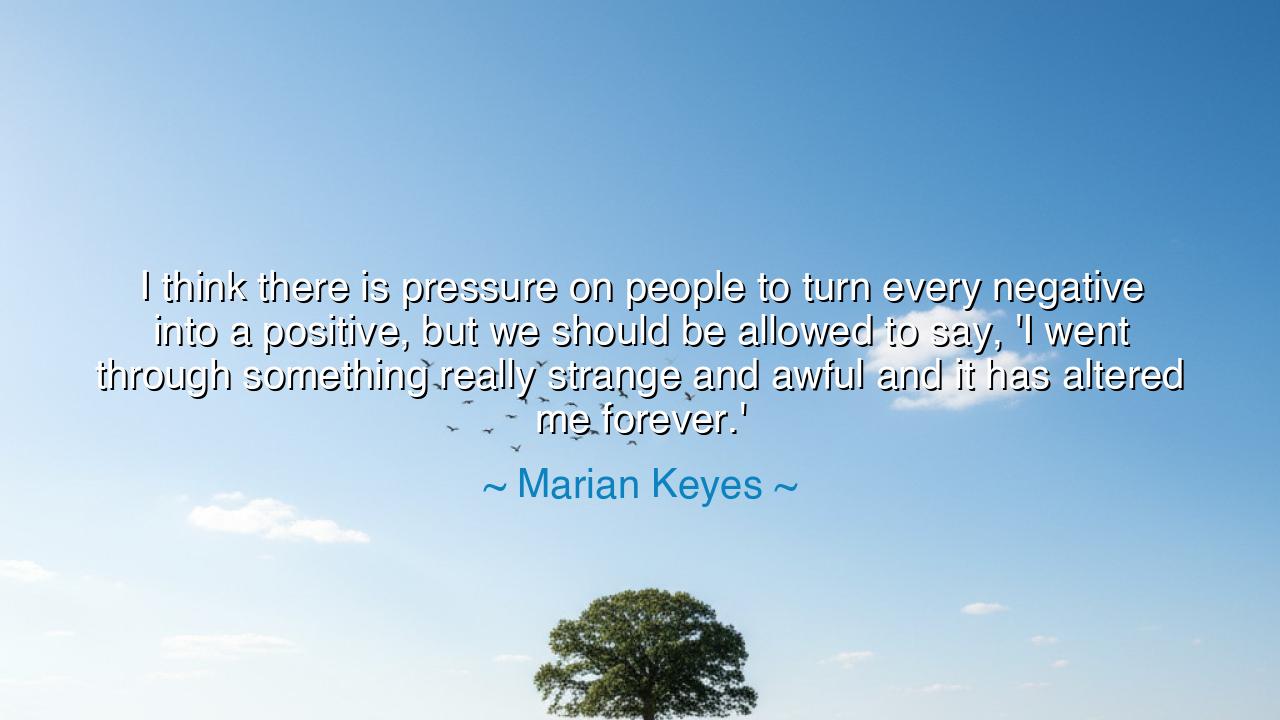
I think there is pressure on people to turn every negative into
I think there is pressure on people to turn every negative into a positive, but we should be allowed to say, 'I went through something really strange and awful and it has altered me forever.'






The words of Marian Keyes—“I think there is pressure on people to turn every negative into a positive, but we should be allowed to say, 'I went through something really strange and awful and it has altered me forever.'”—echo like a cry of honesty in a world that often demands false brightness. She reminds us that not all suffering can or should be painted in the colors of cheer. There are wounds that do not heal into strength, but into scars; there are trials that do not build, but break and reshape. To acknowledge this is not weakness, but truth—and truth is the highest form of courage.
The ancients knew the weight of sorrow and did not hide it. The Hebrews filled their scriptures with lamentations, psalms of anguish that did not pretend that pain was good, but proclaimed it openly before God and men. The Greeks carved tragedies into the stones of their theaters, telling tales not of triumph but of ruin, so that the people might face the awful and strange with eyes unclouded by illusion. Keyes stands in this tradition: she defies the modern command to turn all grief into positivity, insisting instead on the sacred right to name suffering for what it is.
History offers us luminous examples of this truth. Consider the story of Viktor Frankl, survivor of the Nazi concentration camps. In his work Man’s Search for Meaning, he does not claim that the horror he endured was good, nor does he say it should be softened into cheer. Instead, he proclaims that it altered him forever, and that the meaning he found arose not from denying the terror, but from confronting it. His wisdom shows us that true strength lies not in pretending that evil is good, but in accepting that it has changed us, and then asking what we will do with that change.
Keyes’ words also expose the danger of pressure—the cultural demand to be relentlessly positive, to plaster smiles over brokenness. Such pressure silences the grieving, isolates the wounded, and dishonors the reality of suffering. To tell a person that they must transform every pain into inspiration is to deny them the dignity of their humanity. For sometimes grief must be spoken, wounds must be acknowledged, and brokenness must be accepted, before healing or growth can ever begin.
And yet, her insight does not banish hope; rather, it deepens it. By admitting that some experiences alter us forever, she teaches that we emerge from suffering not as who we once were, but as something different. To carry scars is not to fail, but to be marked by the journey. This is not the shallow positive spin that denies pain, but the deeper wisdom that honors it. Just as iron once broken and reforged is forever changed, so too are we reshaped by the trials we endure.
The lesson for us is clear: do not be enslaved by the demand to make every sorrow sweet. Allow yourself and others the space to say, “This hurt me. This changed me.” In this honesty lies true healing, for it is only when we face reality without disguise that we can walk forward with authenticity. Do not fear to admit that you have been marked by life, for such marks are the sign that you have lived deeply.
So, dear listener, take Marian Keyes’ words as both shield and compass. When sorrow visits, do not pretend it is joy. When you are altered, do not deny the change. Speak your truth without shame, for in that truth lies dignity, and in that dignity lies strength. For though the world may demand constant smiles, the soul is nourished by honesty. And it is only by embracing both the light and the awful shadows that we become fully human.






Hht
This quote makes me reflect on societal narratives of success and recovery. Does the expectation to always find meaning in suffering put unfair pressure on individuals to perform emotional labor for others? I wonder how we can create space for people to simply acknowledge that something was awful without feeling compelled to justify it or extract a lesson. Could this approach lead to a healthier understanding of resilience, where growth is not mandatory but possible over time?
ODThi Oanh Dinh
Reading this, I think about the balance between hope and realism. How do we support people who have been through traumatic or life-altering experiences without pressuring them to extract a positive lesson? I also question whether the narrative of turning everything into a positive might inadvertently minimize genuine suffering. Could embracing the complexity of human experiences, both painful and transformative, foster empathy and deeper connections rather than enforcing an artificial optimism?
DNDieu Nguyen
I find this statement very relatable. It raises questions about resilience and vulnerability—can people truly process hardship if they are constantly encouraged to transform it into something positive? I also wonder about cultural differences: are some societies more forgiving of openly expressing pain without moralizing it? Could normalizing honest acknowledgment of difficult experiences help reduce shame and create more supportive communities, allowing people to share their struggles authentically?
DHDong Ho
This perspective is refreshing because it challenges the modern obsession with forced positivity. I wonder how societal expectations to always 'find the silver lining' affect mental health and authenticity. Can acknowledging trauma or difficult experiences without immediately reframing them as positive contribute to deeper healing? I’m also curious whether this pressure to spin negatives positively is more pronounced on social media, where people often feel compelled to present curated, optimistic versions of themselves.